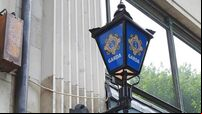Gardaí urge people who suspect they are victims of cyber-related crime to them

It comes following reported incidents of people receiving calls from people posing as HSE staff as a means to try and obtain information including bank details. Picture: Pexels
An Garda Síochána has encouraged people who have reason to suspect they are victims of cyber-related crime to their local station or the Garda Confidential Line.
It comes following reported incidents of people receiving calls from people posing as HSE staff as a means to try and obtain information including bank details.
Following the recent cyberattack on the HSE’s IT systems, reports that some peoples’ medical information had been leaked online began circulating, however, An Garda Síochána has said that it has not been confirmed with any certainty that any personal records or data have been leaked “even though this is probable and would be a feature of these attacks”.
An Garda Síochána has advised that they, the HSE, the Department of Social Welfare or other state agencies will not cold call a person looking for personal information such as Date of Birth, PPS numbers or bank details.
An Garda Síochána also encourages people who have reason to suspect they are victims of cyber related crime, particularly the recent criminal cyberattack of the HSE, to make a report at their local Garda station.
of the public have been warned that scam and fraud attempts by email, text and phone are continuing and that scammers are ing people in relation to the underpayment or overpayment for some goods or service, eligibility for a refund or social welfare payment, that they are being investigated in relation to criminal activity, or about the possible leak of personal information.
“The current automated phone call scams may appear to emanate from official/ authentic numbers and have included State offices including allegedly from Garda Síochána numbers.
“If you engage with these callers, during a conversation they may elicit information from you and then use that information to suggest they were already in possession of it, gaining your confidence.
“You can check the legitimacy of the caller, by terminating the call and then make back by a publicly d number for that organization/ agency/ company, directly dialled by yourself, redial a number,” a spokesperson said.
On receipt of these communications, An Garda Síochána advice is not to engage with the caller, not to follow any instructions given by the caller, not to click on any links in emails or text messages, not to apps or remote access software, and not to send money or withdraw money and lodge it into cryptocurrency ATMs, and to also screenshot the email, text message or other communications.
In a statement, the spokesperson confirmed that the Garda National Cyber Crime Bureau (GNCCB) is continuing its criminal investigation into the cyberattack on the HSE in conjunction with local and international partners.
“An Garda Síochána continues to encourage people who have reason to suspect they are victims of cyber-related crime, particularly the recent criminal cyberattack of the HSE, to make a report at their local Garda station.
“An Garda Síochána has not confirmed with full certainty that any personal records or data reported to have been circulated are in fact genuine even though this is probable and would be a feature of these attacks,” the spokesperson said.
Speaking on the Today With Claire Byrne Show on RTÉ Radio 1, Minister Ossian Smyth said he was not aware of any cases of people receiving calls as a result of the cyber attack.
He was responding to Ms Byrne who said that there had been reports in two media outlets of people receiving calls with information relating to their medical history.
Minister Smyth, who is responsible for Communications and eGovernment, said however: “The Garda National Cybercrime Bureau will follow up on those (reports) and see if they are accurate, whether the person is presenting false information, whether it is an urban myth or whatever.”
But he said that it is something which could happen.
He added: “The Department of Justice ed all the garda stations and prepared them and explained to them that they were to take calls from of the public who feel that their health data had been breached and if anybody has been under threat of extortion or blackmail from somebody that they should their local garda station and if they feel uncomfortable doing that, to call the Garda confidential line which is 1800 666111. That will help with the investigation because it is a criminal investigation.”










 App?
App?


